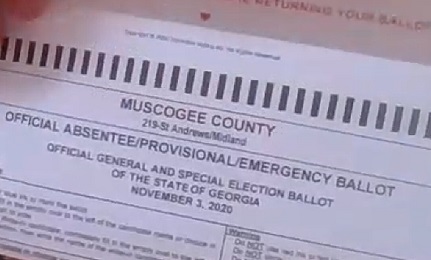Analysis by WorldTribune Staff, March 2, 2021
The Georgia House of Representatives has passed election reform legislation which the main Republican sponsor said was designed to restore voters’ confidence in the system following the 2020 presidential election.
What millions of voters want to know is, why couldn’t lawmakers conduct a comprehensive audit of the 2020 election before tackling election reform for the future?

The legislation does not address alleged voting machine irregularities, which critics say were widespread in the 2020 election. In 2019, Georgia spent $100 million to buy new voting machines for every voting precinct.
The Georgia legislation, HB 531, passed the Republican majority House on a party line vote of 97-72 and is headed to the state Senate for further debate.
Georgia Democrats have already vowed to go to court over any version of the election reform bill that is signed into law.
Which led many netizens to slam the Georgia House’s move as “too little, too late.”
The legislation is “Like giving a pacifier to a baby, here you go sheep! We just cancelled your vote and stole your election, but this will make you feel better until next time, now go back to sleep you sheep!,” said one response to The Epoch Times’ report on the Georgia bill.
Another responded: “How about open transparent audit of the LAST ELECTION? !!! Get THAT one sorted out, then we’ll see about trusting our BS elections again or not!”
Republicans in the Georgia House said their bill sets up multiple requirements for absentee ballots.
Voters would have to submit their driver’s license number, their state identification card, or the last four digits of their Social Security number on the ballot envelope. If the voter lacks a government ID, the bill requires a copy of a current utility bill, bank statement, government check, paycheck, or other government document that shows the name and address of the voter.
Voters would be able to request an absentee ballot up to 78 days before the election, instead of the current 180 days. The absentee ballots and early votes would have to be received by 11 days prior to election day.
The government, including election officials, would not be allowed to mail out unsolicited applications for absentee ballots to voters. Only authorized relatives or persons signing as helping a voter who is illiterate or physically disabled may apply on behalf of another for an absentee ballot application.
Election officials also must not send out absentee ballots until four weeks prior to the election.
Drop boxes would still be allowed under the new bill but subject to a number of restrictions.
There would be a limited number of drop boxes, where every county would have at least one drop box but no more than one per 100,000 active voters or one for each early voting site. Any given drop box must be located at the office of the board of registrars or absentee ballot clerk, or indoors at an early voting site. The drop boxes are only open when those sites are open and be under constant surveillance “by an election official or his or her designee, law enforcement official, or licensed security guard.”
Among other voting requirements, the bill also prohibits people to solicit votes, distribute or show any campaign material, or provide money or gifts—including food and drink—within 25 feet of voters standing in line at any polling place, and within 150 feet of any polling place.
Separately, the GOP-majority Senate on Feb. 23 introduced its own version of an election reform bill, SB 241 that has some overlap with HB 531. One difference is that the Senate bill would eliminate no-excuse absentee voting, something that has been allowed in Georgia since 2005, whereas the House bill would still allow no-excuse absentee voting.
Intelligence Brief __________ Replace The Media
